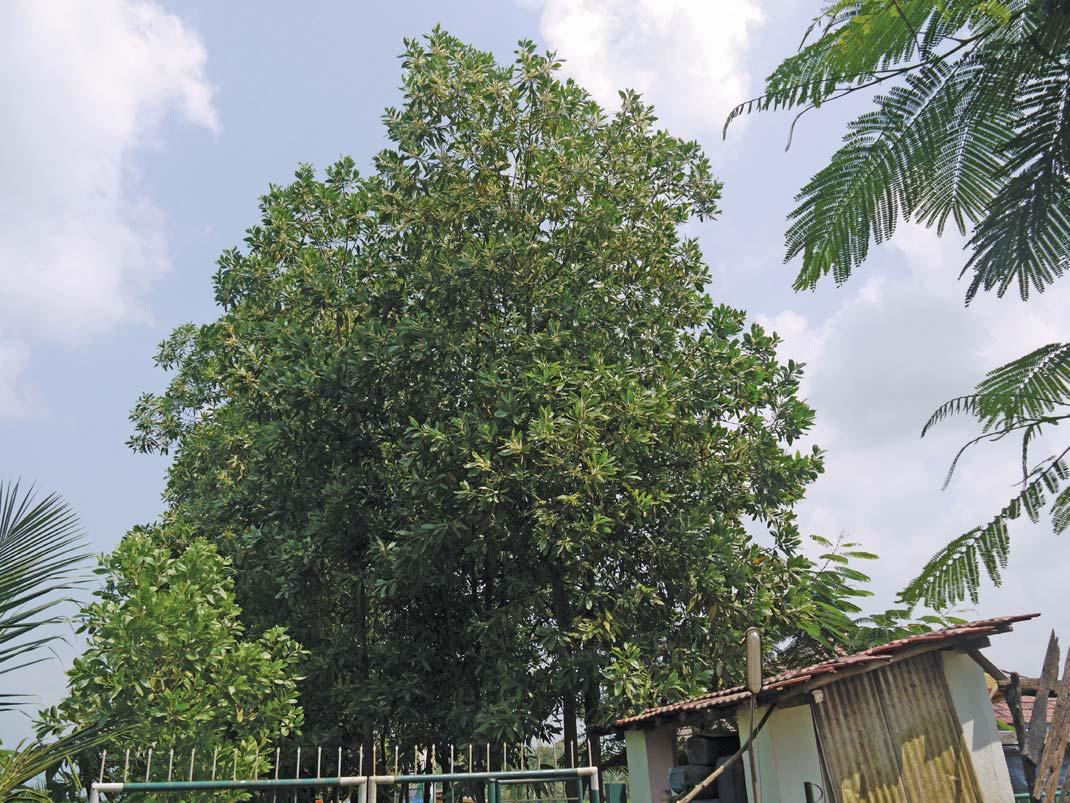
The hickory or screw-pod wattle (Acacia implexa) is an erect tree up to 15m tall. It has a single stem or is divided near ground level into two or three main stems. The leaves are dark green, narrowly elliptic and sickle-shaped, 7cm to 20cm long and 6mm to 25mm wide, and narrow at the base. The bark is rough and greyish.
The flowers are arranged in globular heads, are creamy to pale yellow, and flower from December to March.
The pods are narrow (4mm to 7mm wide), coiled, and twisted to a length of 25cm. The seeds are dark brown. Hickory wattle is native to Australia. According to the South African National Biodiversity Institute (SANBI), A. implexa has been recorded in the Western Cape at Tokai forest, Stellenbosch and Wolseley.
Environmental and economic impact
This fast-growing tree invades agricultural lands, planted forests and disturbed areas. It can become highly invasive if not controlled. It spreads through suckers (shoots that grow from the base or the roots of the tree).
The National Environmental Management Biodiversity Act of 2004 (NEMBA) classes the tree as a Category 1a invasive plant, an invasive species requiring compulsory control.
“Any specimens of Category 1a listed species need, by law, to be eradicated from the environment. No permits will be issued,” states SANBI.
Esta historia es de la edición Farmer's Weekly 12 May 2023 de Farmer's Weekly.
Comience su prueba gratuita de Magzter GOLD de 7 días para acceder a miles de historias premium seleccionadas y a más de 9,000 revistas y periódicos.
Ya eres suscriptor ? Conectar
Esta historia es de la edición Farmer's Weekly 12 May 2023 de Farmer's Weekly.
Comience su prueba gratuita de Magzter GOLD de 7 días para acceder a miles de historias premium seleccionadas y a más de 9,000 revistas y periódicos.
Ya eres suscriptor? Conectar

Optimising cherry production and quality
Growing cherries in a suboptimal climate requires manipulating trees and temperatures. But with a considerable market advantage, it is worth the effort. Lindi Botha visited ZZ2's Toscana farm, which for four weeks of the year takes prime position in the cherry market.

Biosecurity & nutrition: the foundation of pig farming success
JD Mostert, a consulting swine nutritionist at CS Vet, and Dr Stefan Steyn, a veterinarian at Afrivet, shared their expertise with Sinenhlanhla Mncwango, delving into why biosecurity and nutrition are critical pillars in establishing and maintaining a productive pig farm geared for long-term success.

The business of pig farming: practical steps for success
Running a pork farm requires knowledge and expertise. Mosele Lepheane, director of a small piggery in the Free State, spoke to Sinenhlanhla Mncwango about the structured approach needed to succeed, from drafting a business plan and managing cash flow to sourcing equipment and expanding market access.

A bright future awaits SA's Boran
Hurwitz Farming has become synonymous with Boran cattle in South Africa. But it hasn't always been plain sailing. Simeon Hurwitz spoke to Janine Ryan about the increasing popularity of this breed.

Get calves' feed exactly right
Give calves dry feed from two to three weeks. Milk alone isn’t enough, said this dairyman.

Syngenta Seedcare celebrates a decade of innovation
Syngenta's ambition is to enable their customers' investments to grow in healthy soil from treated seeds to young plants through innovation and collaboration, writes Magda du Toit.

Agri workers shine at Western Cape awards
Lindie-Alet van Staden, a garden and olive orchard manager at L’Ormarins Wine Estate in Franschhoek, was crowned as the Western Cape Prestige Agri-Worker of 2024 at a gala event recently held near Paarl.

Small and large farmers recognised at grain awards
The annual Grain SA/Syngenta awards ceremony bears testimony to the quality of farmers in the grain industry.

Growing partnerships: Fedgroup's flexible and innovative approach
Janine Ryan spoke to Warren Winchester, general manager of impact investing at Fedgroup, about why the company became involved in agriculture, and what it offers farmers and their immediate communities.

Why fish farms fail, and how to avoid becoming a statistic
The popularity of launching fish farms is not matched by their success. Leslie Ter Morshuizen, owner of Aquaculture Solutions, explores the factors that cause most of these businesses to go under.